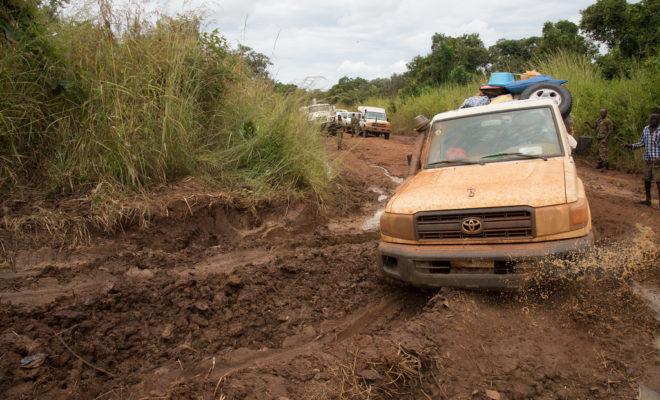South Sudan needs roads for peace. Literally.

Delivering aid in South Sudan costs seven times more than in Somalia. 40% of funding is spent on transport.

An humanitarian mission in South Sudan on a 2-day journey from Juba to Yei, 180 km away. Credit: UN\UNMISS\Nektarios Markogiannis
I recently needed to travel 150 km from the capital Juba to the town of Bor for a humanitarian mission. My options were to fly the short distance or go by road. I ended up boarding a ten-seater airplane. South Sudan’s infrastructure is such poor quality that driving would have taken an entire day.
South Sudan’s lack of all-season roads presents a serious challenge when it comes to delivering aid. NGOs often have to rely on air travel to move people and supplies across states, especially during the rainy season. As a result, South Sudan is one of the most expensive countries in which to implement humanitarian programmes. Delivering aid in South Sudan is estimated to cost an astronomical seven times more than in Somalia, a country afflicted by decades of civil war.
South Sudan has an opportunity, however, to turn this around. After years of conflict, warring leaders have agreed to a peace deal and unity government. This gives the country at least a tentative chance to rebuild and look ahead.
Why roads?
In this moment of calm, there are of course an untold number of priorities. After a devastating conflict, there is the need for investment in all sectors, from education to health. Better roads may seem like a luxury, but the benefits of investing in transport infrastructure are crucial and would spread far and wide.
To begin with, large-scale infrastructure projects provide much-needed employment. Improving South Sudan’s roads would create jobs and inject much-needed cash into local economies. According to the World Bank, infrastructure projects in North Africa and the Middle East in the 2000s contributed to a 30% increase in employment.
Once the roads are complete, they will further boost economic prospects by connect farming communities to markets. Given that over 90% of South Sudanese make a living from farming, this would be hugely significant. Better transport would also give communities increased access to critical social services such as schools and hospitals. Amongst other things, this would create a better-educated and healthier work force to help propel the economy into the future.
Roads in fragile states like South Sudan can also be an indirect avenue to peace. Over 70% of South Sudan’s population is under 30, the majority of whom have no education or skills training. Often, this means that joining armed groups is the most viable option to make a living. Large infrastructure projects that provide immediate employment can keep these young people in alternative gainful employment. We have seen this work before. In the early 2000s, Nepal’s Rural Access Roads Programme supported peace building efforts in conflict areas by deliberately targeting young people.
Building for the future
Despite these clear benefits, international donors are usually reluctant to fund infrastructure projects, particularly during an ongoing humanitarian response. They fear that the inflow of funds might lead to contestation and deepen ongoing conflicts, especially if the different groups perceive there to be discrepancies in their levels of participation and ownership of the project. These are legitimate concerns, but many of these risks can be mitigated with proper safeguards put in place at the design and implementation stage.
Donors should also be assured that better infrastructure reduces any future cost of delivering humanitarian aid. According to the 2018 South Sudan Humanitarian Needs Overview, approximately seven million people – over half of the country’s population – need humanitarian assistance in 2018. If there was adequate investment in the transport infrastructure, South Sudan would not need the whopping $1.7 billion required for this effort, nearly 40% of which is devoted to transport costs.
Infrastructure projects alone can’t be expected to mend the past five years of fighting. That’s why peace building and governance initiatives as well as social safeguards should be deliberately embedded in these initiatives too. Ancillary programmes such as skills training and village savings and loans schemes can be offered to community members working on these projects to prepare them for the period after the project’s closure. Evaluations on the successes of the Sierra Leone peace building efforts after a ten-year civil war have concluded that community-based approaches are key to achieving sustainable peace.
We are at a critical juncture in South Sudan’s history. The situation remains fragile and there are countless challenges ahead, but at this moment, the government and its development partners need strategies that will improve both the social economic status of the country while at the same time creating lasting peace. Investing in large scale infrastructure development programmes like road construction is one of the best ways to achieve this.





